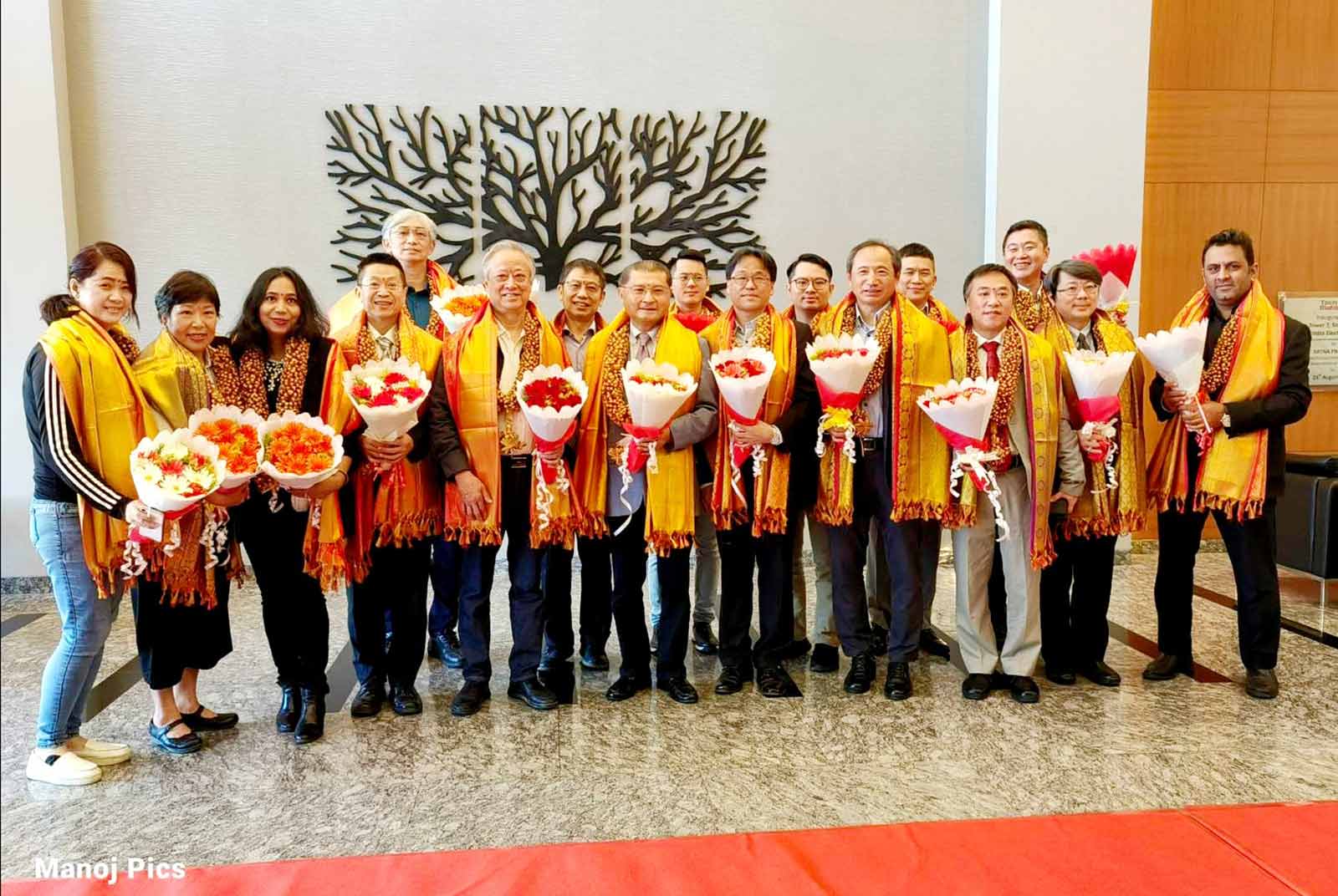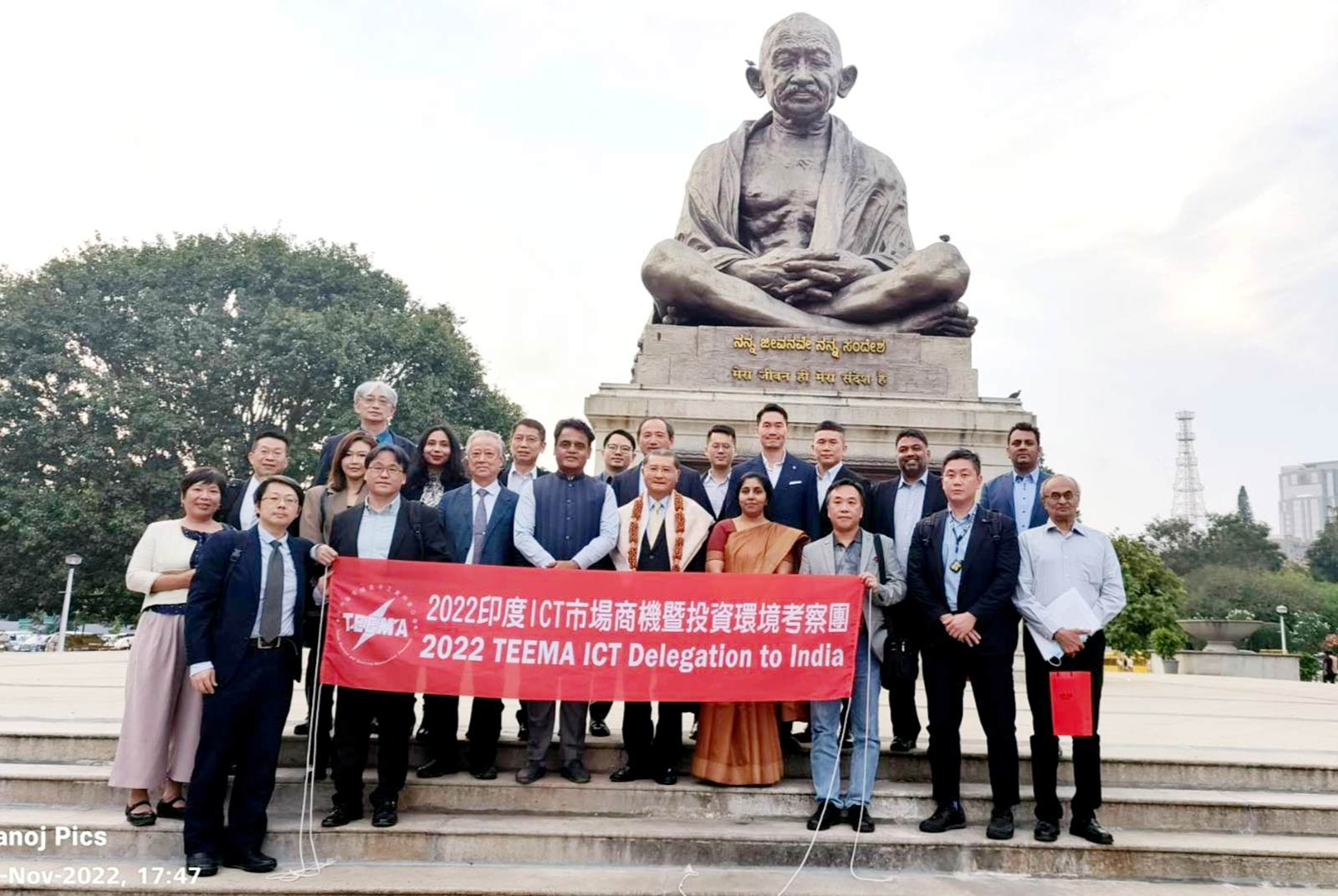

Source:2022 TEEMA/TIBA ICT Delegation to India
India, with a 1.4 billion domestic market and its talent pool is worth exploring, however, Taiwanese businesses had been hesitant to take action. In this op-ed, Taipei-based attorney Arpita Dutta shares her opinion on how Taiwanese companies can take advantage of what India has to offer.
By Arpita Duttaweb only
With the relaxation of the quarantine rules in Taiwan, business activities between Taiwan and India began to pick up momentum again.
In the first week of November, three Taiwan-India memorandums of understanding aimed at fostering electronics manufacturing and green technologies were signed and, in the following week, several high-level business delegations from Taiwan Electrical and Electronic Manufacturers' Association (TEEMA) and Taiwan India Business Association (TIBA) visited India, where the TEEMA Chairman, Mr. Richard Lee, and Taiwan’s de-facto Ambassador to India, Mr. Baushuan Ger, played a crucial role in both occasions. The TIBA board of directors Mr. Chin Der Ou played a key role in planning this delegation trip. I am fortunate to have had the opportunity to attend this trip with the TIBA and TEEMA delegations to consolidate and enhance the India-Taiwan bilateral investment framework.
The three important items on the agenda of this TIBA- TEEMA delegation visit were: a.) visiting India based-Taiwanese businesses, b.) visiting potential Indian business partners, and c.) organizing a rigorous discussion with the state governments including the IT ministers of several states.
Visiting Taiwanese companies running in India provided insights into how Taiwanese companies are adapting to the work culture/environment in India and the challenges they faced. A detailed discussion on the business environment in India and its implications for the HR, supply chain, and many other critical and important aspects of business was discussed.
The recent Foxconn India incident has aroused great concern over the situation in India among Taiwanese businesses. Foxconn’s reaction to that set the tone for Taiwanese businesses’ expansion into India. We recently noticed that Foxconn has been planning to proactively expand production and quadruple the workforce in India, which sent the message that there has been improvement in the Indian industrial environment. This will not only leverage the Foxconn production in India but also bring confidence to Taiwanese businesses planning to expand in or relocate to India.
During our visit to prominent Indian entities such as Tech Mahindra, Tata Consultancy, TVS, and others, we saw their utmost collaborative lookout from a broad perspective, which clearly showed how India-Taiwan hardware and software collaboration will create a new dimension in the IT industry.
It was repeatedly emphasized that localization plays a crucial role while offshoring a business, and therefore Taiwanese industries must make sure that their products can be integrated with the culture and language of the 1.4-billion Indian market.
 (Source: 2022 TEEMA/TIBA ICT Delegation to India)
(Source: 2022 TEEMA/TIBA ICT Delegation to India)
In addition, these aged old companies also advised us regarding building effective supply chains. Since India is a big country and industry clusters are scattered, companies need to take a holistic approach towards their supply chain management. Visiting these companies provided a great opportunity for cultural understanding to the Taiwanese delegations, whose members were deeply touched when they were greeted in the traditional south Indian ways, including the offerings of uttorio (honorary scarf), Mysore Peta (the king's hats), planting trees, and lightning diyas (Indian oil lamp).
Viewing Taiwan as an important collaborative partner, Indian state governments promised a wide range of support in this trip. Invest India, the State governments of Telangana, Tamil Nadu, Andhra Pradesh, and Karnataka showed their immense support and promised to enhance government efficiency to provide a real-time arrangement. They also acknowledged the growing importance of Taiwan-India business collaboration. K T Rama Rao, Telangana Minister for IT and Industries, and Dr. Ashwath Narayan C.N., Minister of IT, BT, Electronics, Science and Technology, and Skill development of Karnataka both discussed a wide range of collaboration opportunities.
Even the Telangana government promised to arrange 250 acres of land to build an India-Taiwan industrial park during a round table talk. A cluster of Taiwan businesses will not only bring efficiency but can work as a pull factor to attract investment. Concerning this idea, Taiwan-based CDCI and Century Development Corporation (世正開發股份有限公司) have already opened the Technology Innovation International Park (TIIP) in Bangalore to integrate an industrial township for Taiwanese business. Many Taiwan-based companies have already started their manufacturing facilities on that campus.
With an aim to relocate from China, this collaboration will serve as a preeminent example of an industrial facility for Taiwanese companies.
The insights from this trip might provide sufficient confidence to Taiwanese companies that are under certain stereotypical impressions about India. It is widely known that many Taiwanese businesses are hesitant about moving to India due to concerns over language and cultural barriers and are leaning towards moving instead to southeast Asian countries, such as Thailand and Vietnam.
However, such barriers cannot be avoided in Southeast Asia either. Wherever the FDI is destined for, Taiwanese investors must acknowledge that companies need to take precautions against potential disputes in advance.
Since we have already seen how the basic engagement model plays a crucial role and welcome serious challenges, it is advised that companies do their groundwork, and conduct due diligence to scrutinize the reputation of the collaborators in advance. This groundwork can protect the company against potential disputes and reduce the risk of its reputation getting tarnished in a new investment destination.
In addition, we noticed that the improving ease of doing business in India has erased the myth of the Indian business registration process being complicated. In recent years, some companies have even experienced registration done in one day with complete documents.
This intense and engaging talks with the Indian government and Taiwanese companies surely will open doors to more collaboration in the foreseeable future. The policies "Made in India" and "Production Incentive Evolution" along with several other subsidies can complement Taiwan's "New Southbound Policy," and
Taiwan-India collaboration will turn the aspiration of an Indian manufacturing hub into reality.
This delegation visit was an essential step since it aimed to understand the gaps and opportunities to advocate the sustainability of Taiwanese business in a new jurisdiction. From this delegation visit we can consolidate the following key takeaways:
- India has an abundant talent pool, a wise use of Indian talent will maximize business growth.
- Product localization will play a crucial role in penetrating into the 1.4 billion Indian market.
- Appropriate supply chain will streamline business management.
- Due diligence shields a company against potential disputes and reduces the risk of age-old brand reputation getting tarnished.
- It is time to break the monotonous thinking of India-Taiwan cultural barriers.
About the author:

Arpita Dutta is a legal consultant at ‘Louis International Patent Office’, ‘Louis & Charles's Attorneys at Law’ and ‘STARBOARD Incubator’. Her background has been civil and corporate laws in India. In Taiwan, she has been providing legal support in seasoned industries for corporate and IP disputes and the investors for their intended ventures in India and Taiwan. She is a guest lecturer at National Taipei University of Technology and Chang Gung University.






